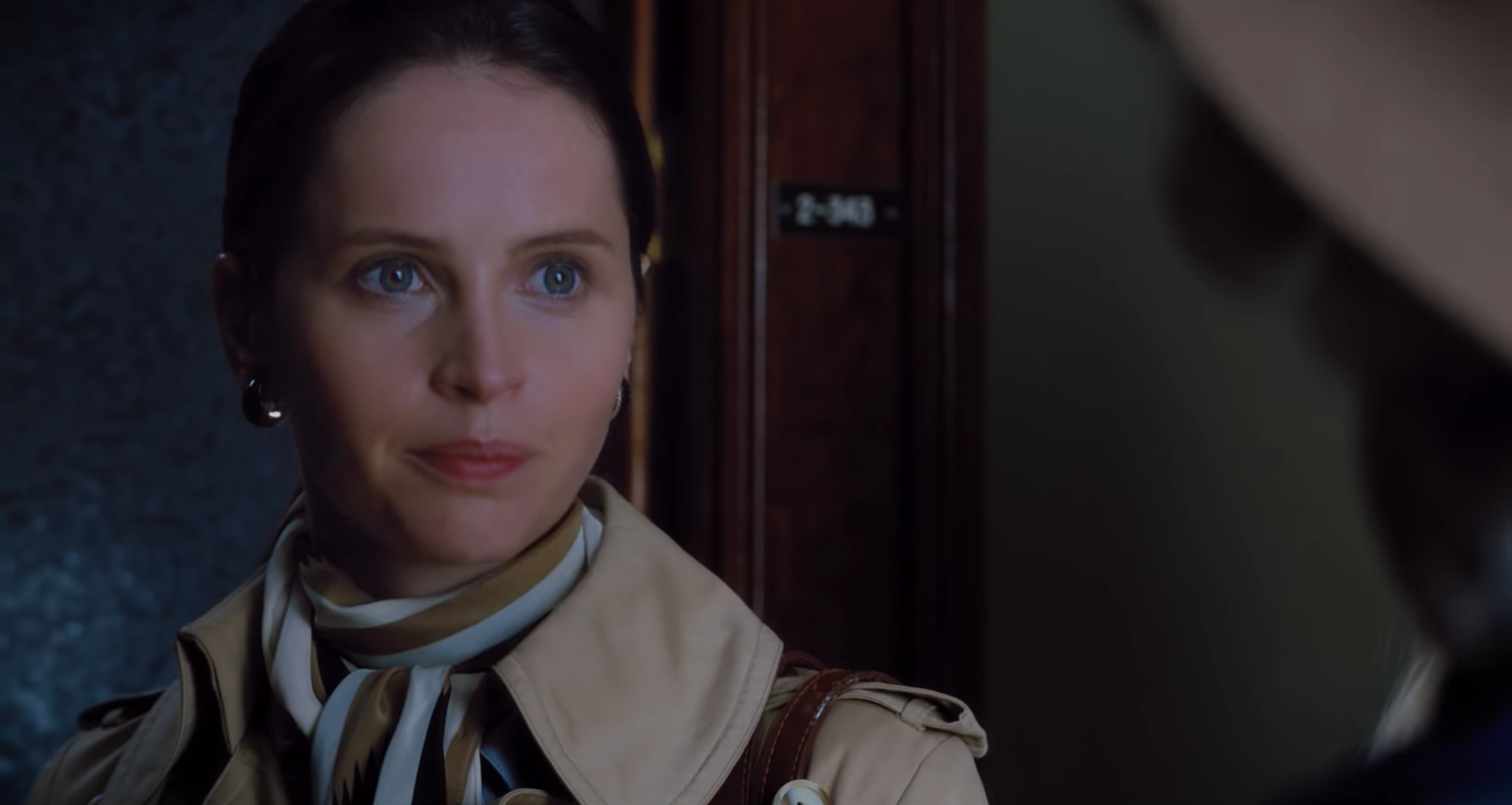If you are anything like me (and if you’re reading Alma, chances are we have a fair bit in common), you were really excited, when, a few years ago, Focus Features announced they would be making the Ruth Bader Ginsburg biopic On the Basis of Sex. As a Jewish public interest attorney, RBG is an idol of mine, and not just because of her cutting Supreme Court decisions (and dissents) — but because as a young attorney, she defied and challenged both social and legal norms and precedents. Ruth Bader Ginsburg is truly a legal, feminist, and fashion icon. She’s also a Jewish icon: with her “Jewish nose,” her thick Jewish-Brooklyn accent, and her feminist Passover d’var torah.
When it was announced that Natalie Portman — a fellow Jewish icon — would be playing the role of Ginsburg in the film, it seemed too good to be true.
Turns out, it was. Imagine my reaction when I opened up the trailer for On the Basis of Sex last week and saw Felicity Jones grace the screen. British Felicity Jones, with her fine features and her awkward American accent, beautiful, perfectly manicured, and erasing any trace of Ginsburg’s roots.
Despite the fact that the trailer was only released in July, there has already been a fair amount of ink spilled about Jones’ poor attempt at RBG’s signature accent. However, anyone who has ever heard Justice Ginsburg recount a conversation she had with her granddaughter (who refers to her as “Bubbe”) knows that this is not just your average Brooklyn accent; it’s a Jewish Brooklyn accent, the kind of accent born out of the Jewish Russian immigrant experience.
But I think what hurts more about watching Jones portray the first female, Jewish Supreme Court Justice is how little they physically look alike. Justice Ginsburg has strong, identifiably Ashkenazi Jewish features. She looks Jewish. Missing from Felicity Jones is any trace of RBG’s large Jewish nose. In its place is a delicate, slightly upturned nose. One that conforms more closely with White Western Christian standards of beauty. Frankly, the absence of RBG’s schnoz is bumming me out.
I am not arguing that they needed to cast a Jewish actress as Ruth Bader Ginsburg, although maybe they should have. I am not even arguing that they should have cast someone who looks like Ruth Bader Ginsburg, although I’m not sure why they didn’t when we all know what she looks like. I’m just saying if they had to cast someone who doesn’t naturally share these attributes with RBG, then the least they could have done was make her up to look like the actual woman in all her Jewish glory.
This issue is more than skin deep. Judaism is a huge part of Justice Ginsburg’s identity now, but it also provides another dimension to her early career. While it’s definitely true that when RBG went to law school, it was uncommon for women to attend, and when she challenged legal precedent she was a young woman disrupting what has historically been a boys’ club, it was also unusual to be a Jew in these contexts at the time.
When Ruth Bader Ginsburg entered law school, many top universities still had “Jewish quotas.” Not many Jews were practicing law, and not many historically had done so. So it was not just that she was a woman disrupting these norms and defying conventions in the legal field, she was a Jewish woman in a professional field that did not have many Jews or women. She was a double anomaly. She is doubly impressive.
And yet, any trace of her Jewish identity — from her accent to her face — is erased in the casting of Felicity Jones in the role. This should be pissing people off. Prosthetic makeup is used all the time to transform actors into their roles in biopics. Prosthetics were used to make Nicole Kidman into Virginia Woolf in The Hours and Meryl Streep into Margaret Thatcher in The Iron Lady. So why is it missing here? Why are we allowing a key component of this icon’s identity to be erased? Why do we need a young Ruth Bader Ginsburg — who, it should be noted, was a total babe but really that’s beside the point — to be conventionally beautiful?
The way I see it, this is really problematic for two reasons. First of all, the irony of altering the appearance of a historic figure in order to make her more conventionally attractive in a movie about her combating sexual discrimination is almost too rich to put into words.
Second of all, representation is important.
When Zoe Saldana was cast to play Nina Simone in Nina, the internet broke into a furor because Saldana bears no resemblance to the late singer. Simone’s daughter commented that she opposed the casting choice because her mother had been raised “at a time when she was told her nose was too wide, her skin was too dark” and Saldana has lighter skin and a narrower nose.
The same is true here. Ruth Bader Ginsburg grew up with identifiably Ashkenazi Jewish features at a time when it was not easy being Jewish in her professional field or in society in general. When RBG’s character is robbed of these features, the story loses something. We all lose something. Something important and integral to Ginsburg’s, and America’s, struggle.
And beyond the story, we lose something else. As a girl growing up with a big Jewish nose, I hated my nose because I thought that was what I was supposed to do. I thought my nose was actually incompatible with delicate femininity. How wonderful it would have been to have more examples of that in popular media, to know that it could be otherwise. And how wonderful it would be now to see the story of a young Ruth Bader Ginsburg: hard-headed, trail-blazing, beautiful, and Jewish.
Header Image via Focus Features on YouTube.



